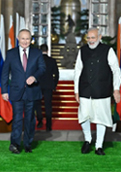Reciprocal Exchange of Logistics Agreement: Roadmap to India’s Strategic Access in the Arctic
By enabling access to logistics and support facilities at each other’s bases and ports, RELOS would enhance strategic cooperation between India and Russia, and promote their future manoeuvres in the Arctic and the Indian Ocean Region.
- Bipandeep Sharma
- January 17, 2022












